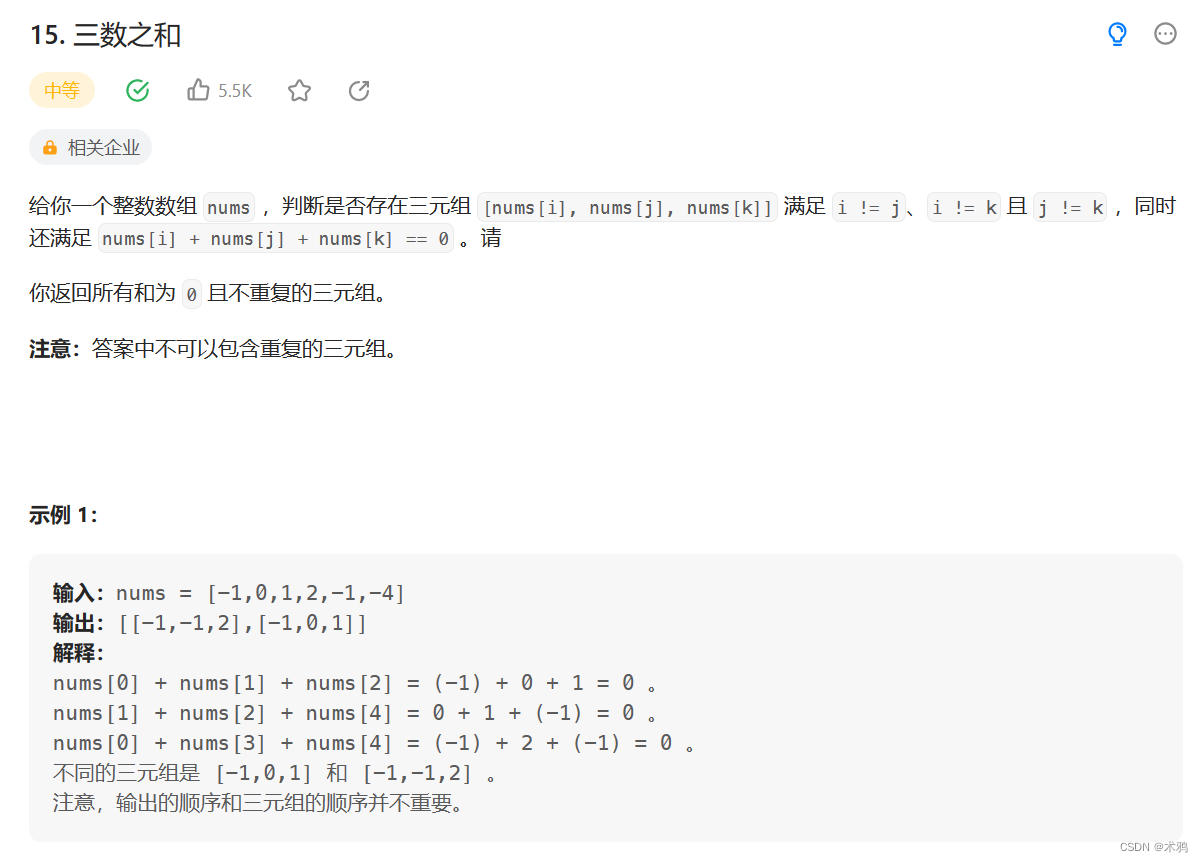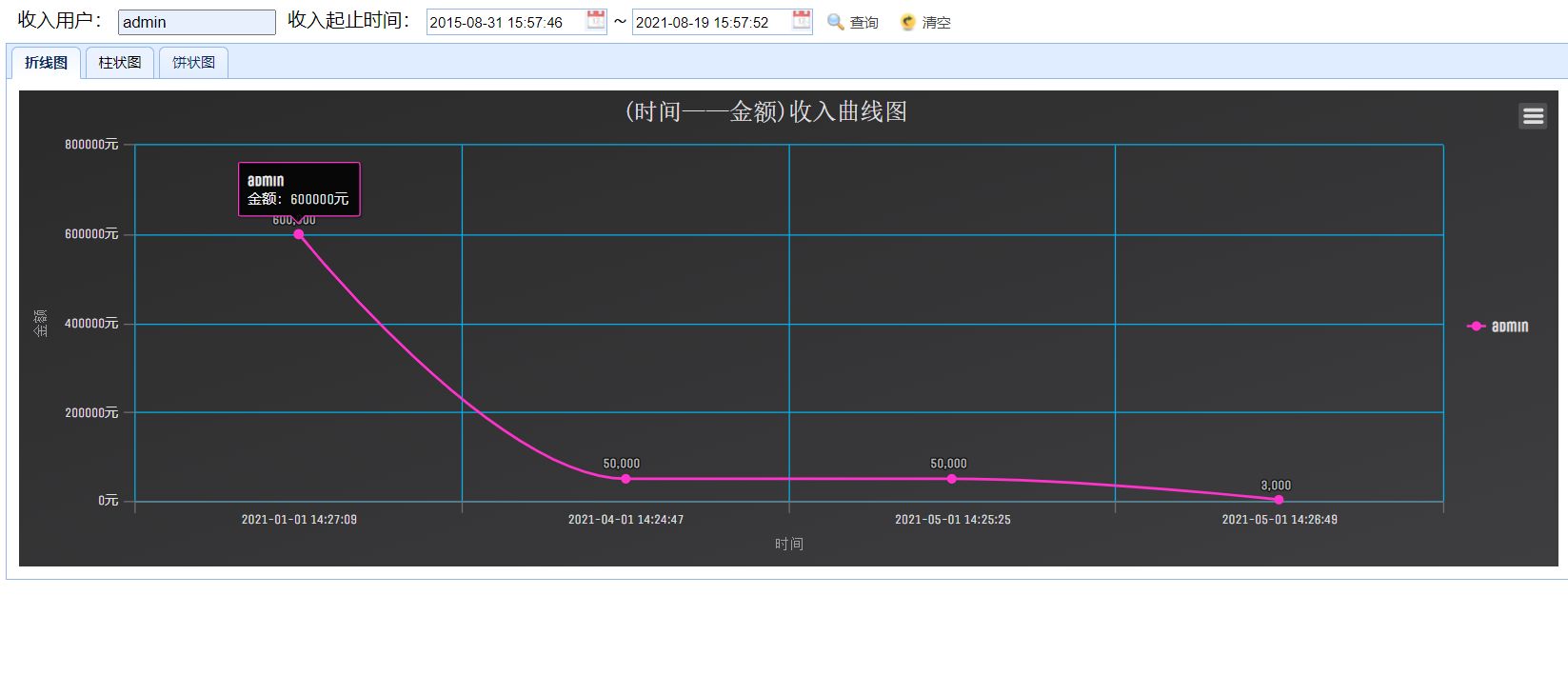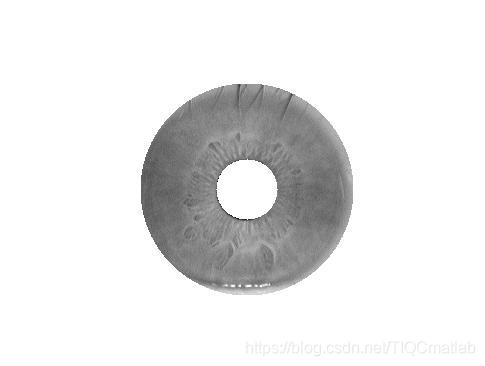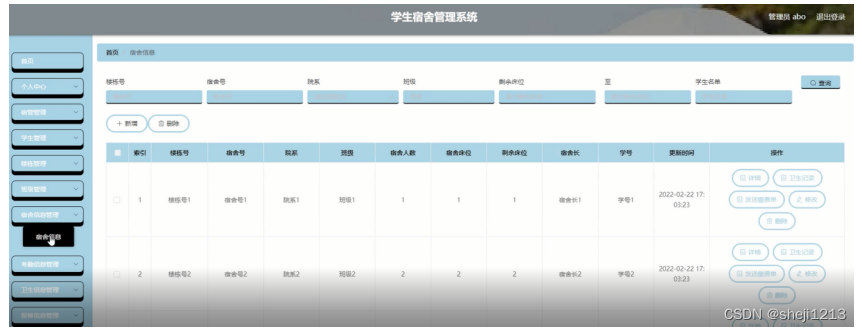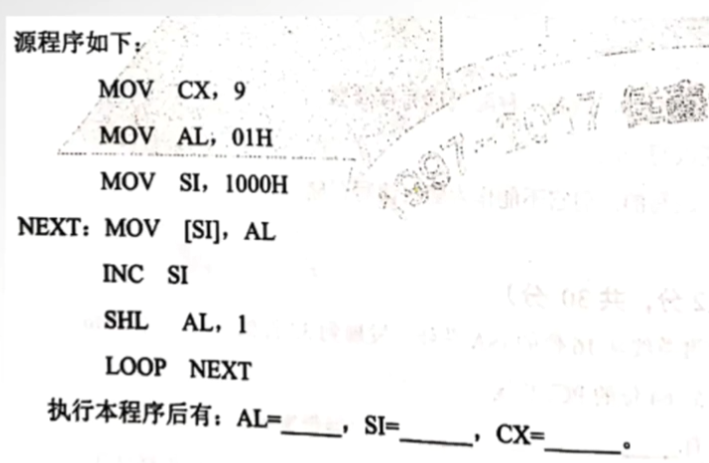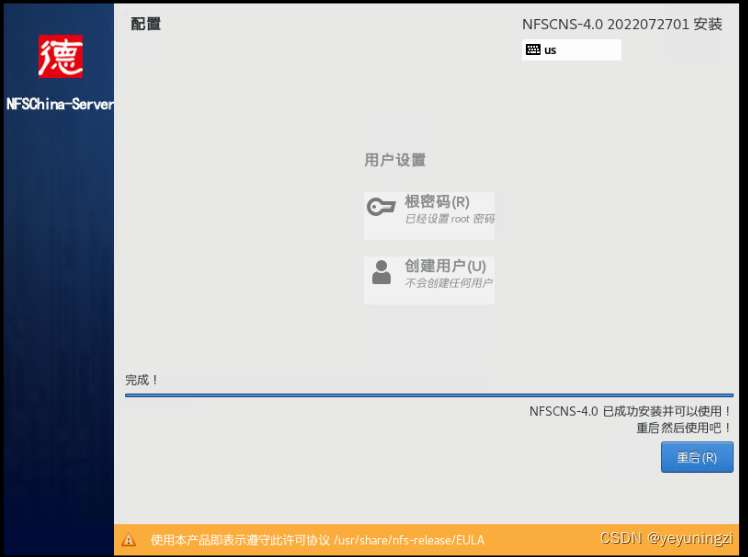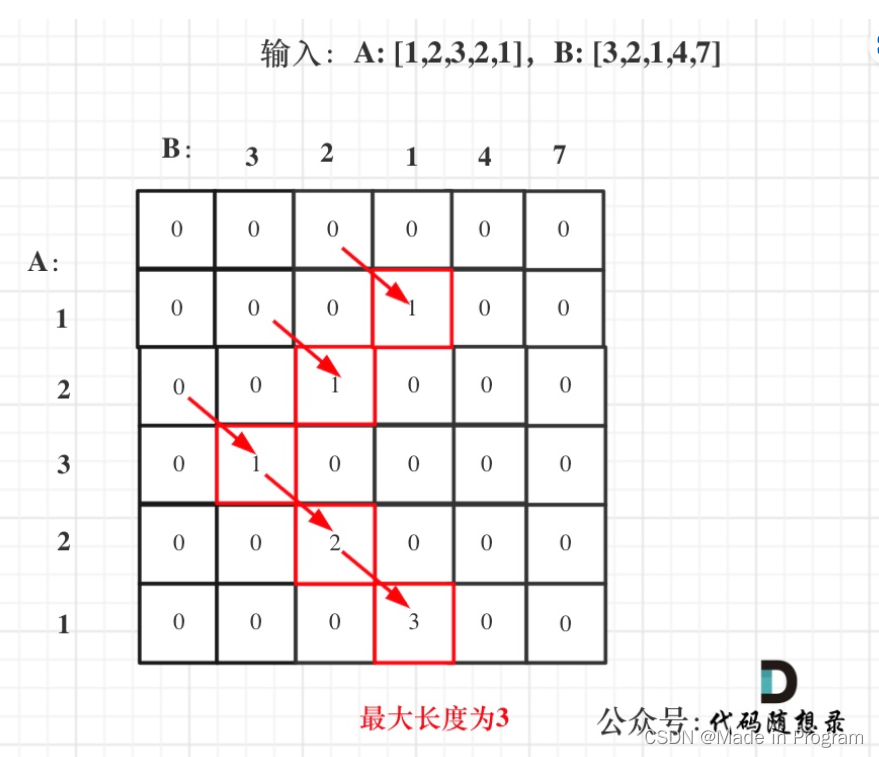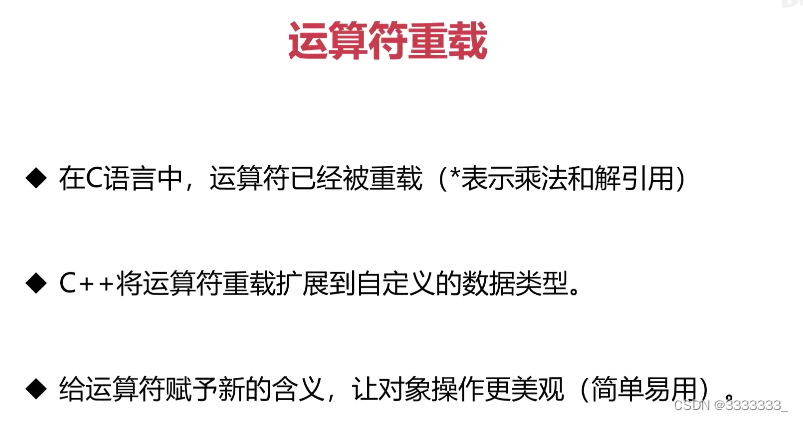
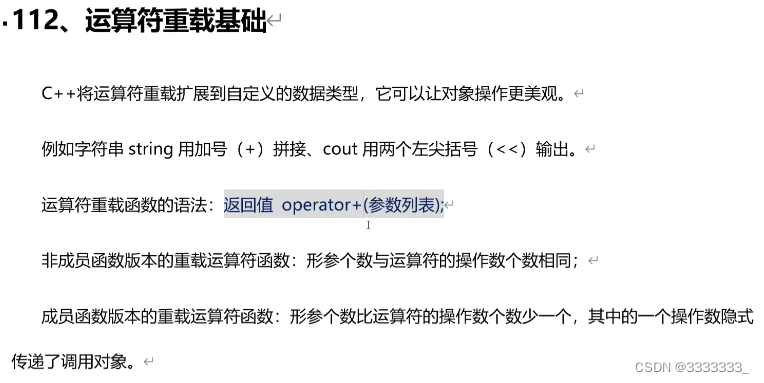
#include <iostream>
using namespace std;
//非成员函数重载+ -
class Person {
public:
Person() {
m_score = 0;
m_name.clear();
}
void show() {
cout << m_name << " " << m_score << endl;
}
int m_score;
string m_name;
};
//全局重载+号
void operator+(Person &p, int score) {
p.m_score += score;
}
//全局重载-号
Person &operator-(Person &p, int score) {
p.m_score -= score;
return p;
}
void test() {
Person p;
p.m_score = 1;
p + 10;
p.show();
p = p - 1 - 2;//同下
// p = operator-(operator-(p, 1), 2);
p.show();
}
int main() {
test();
return 0;
}
11
8#include <iostream>
using namespace std;
//非成员函数重载+ -
class Person {
public:
Person() {
m_score = 0;
m_name.clear();
}
void show() {
cout << m_name << " " << m_score << endl;
}
void operator+(int score) {
this->m_score += score;
}
Person &operator-(int score) {
this->m_score -= score;
return *this;
}
int m_score;
string m_name;
};
void test() {
Person p;
p.m_score = 1;
p + 10;
p.show();
p = p - 1 - 2;//同下
// p = operator-(operator-(p, 1), 2);
p.show();
}
int main() {
test();
return 0;
}注意事项:
1 返回自定义数据类型的引用可以让多个运算符表达式串联起来。(不要返回局部变量的引用)
2 重载函数参数列表中顺序决定了操作数的位置(后面有代码说明)
3 重载函数的参数列表中至少有一个是用户自定义的类型,防止程序员为内置数据类型重载运算符
4 如果运算符重载既可以是成员函数也可以是全局函数,应该优先考虑成员函数,这样更符合运算符重载的初衷。
5 重载函数不能违背运算符原来的含义和优先级。(语法上没有限制不能这么做,但是这么做很垃圾)
6 不能创建新的运算符
7 以下运算符不可以重载
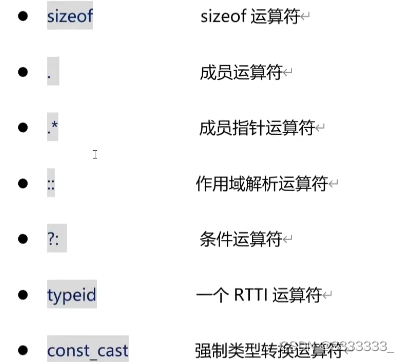
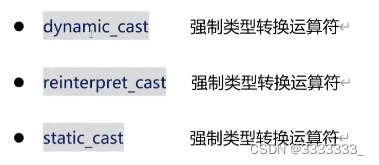
8 以下运算符只能通过成员函数进行重载


重载函数参数列表中顺序决定了操作数的位置 代码说明
#include <iostream>
using namespace std;
//重载函数参数列表中顺序决定了操作数的位置
class Person {
public:
Person() {
m_score = 0;
m_name.clear();
}
void show() {
cout << m_name << " " << m_score << endl;
}
int m_score;
string m_name;
};
Person &operator+(Person &p, int score) {
p.m_score += score;
return p;
}
Person &operator+(int score, Person &p) {
p.m_score += score;
return p;
}
Person &operator+(Person &p1, Person &p2) {
p1.m_score += p2.m_score;
return p1;
}
void test() {
Person p;
p.m_score = 1;
p + 10;
p.show();
//如上,重载的时候 Person &p, int score 顺序是这样,那么下面代码将报错
p + 10 + p;//Invalid operands to binary expression ('void' and 'Person'
//所以需要再写两个重载,顺序是int score,Person &p和Person &p1, Person &p2
p.show();
}
int main() {
test();
return 0;
}
上图 关系运算符和左移运算符重载比较简单,其它几个运算符重载都有一些不一样的地方,C++编译器需要特别的处理。
重载左移运算符
#include <iostream>
using namespace std;
//左移运算符 cout
class People {
friend ostream &operator<<(ostream &cout, const People &p);
int m_age;
int m_score;
public:
People() {
m_age = 18;
m_score = 0;
}
ostream &operator<<(ostream &cout) {
cout << m_age << " " << m_score << endl;
return cout;
}
};
ostream &operator<<(ostream &cout, const People &p) {
cout << p.m_age << " " << p.m_score << endl;
return cout;
}
void test() {
People p;
cout << p << endl;
p << cout << endl;//如果是成员函数的重载,位置就不对了。
}
int main() {
test();
return 0;
}重载下标运算符
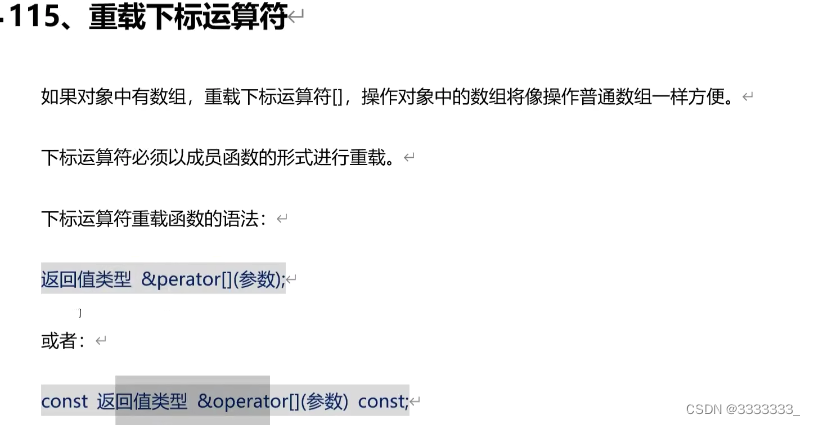


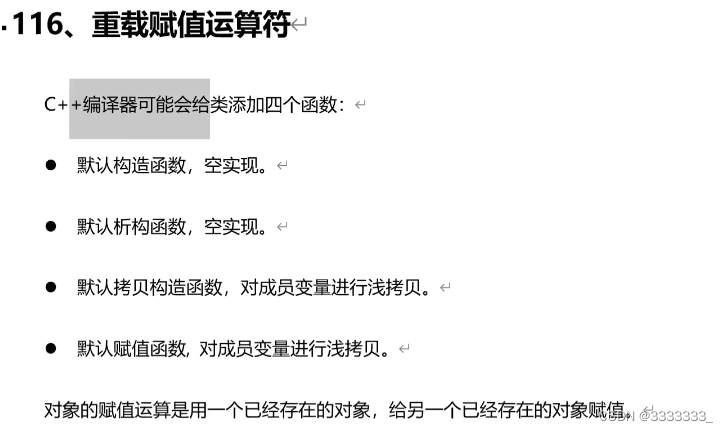

注意:
1 编译器提供的默认赋值函数,是浅拷贝
2 如果对象不存在堆区内存空间,默认赋值函数可以满足需求,否则需要深拷贝。
3 赋值运算和拷贝构造不同:拷贝构造是指原来的对象不存在,用已存在的对象进行构造;赋值运算是指已经存在了两个对象,把其中一个对象的成员变量的值赋给另外一个对象的成员变量。
#include <iostream>
using namespace std;
//重载赋值运算符
class People {
public:
int m_age;
int m_score;
int *m_ptr;
People() {
m_age = 18;
m_score = 0;
m_ptr = nullptr;
}
~People() {
if (m_ptr == nullptr) {
delete m_ptr;
}
}
void show() {
cout << m_age << " " << m_score << endl;
if (m_ptr != nullptr) {
cout << *m_ptr << endl;
}
}
People &operator=(const People &p) {
//如果是自己给自己赋值
if (this == &p) {
return *this;
}
if (p.m_ptr == nullptr) {//如果源对象的指针为空,则清空目标对象的内存和指针
if (m_ptr != nullptr) {
delete m_ptr;
m_ptr = nullptr;
}
} else {//源对象指针不为空
//如果目标对象的指针为空,先分配内存
if (m_ptr == nullptr) {
m_ptr = new int;
}
//然后把源对象内存中的数据复制到目标对象的内存中
memcpy(m_ptr, p.m_ptr, sizeof(int));
}
m_score = p.m_score;
m_age = p.m_age;
cout << "调用了重载赋值函数\n" << endl;
return *this;
}
};
void test() {
People p1, p2;
p1.m_score = 10;
p1.m_age = 10;
p1.m_ptr = new int(2);
p1.show();
p2.show();
p2 = p1;
p2.show();
}
int main() {
test();
return 0;
}
10 10
2
18 0
调用了重载赋值函数
10 10
2重载new&delete运算符
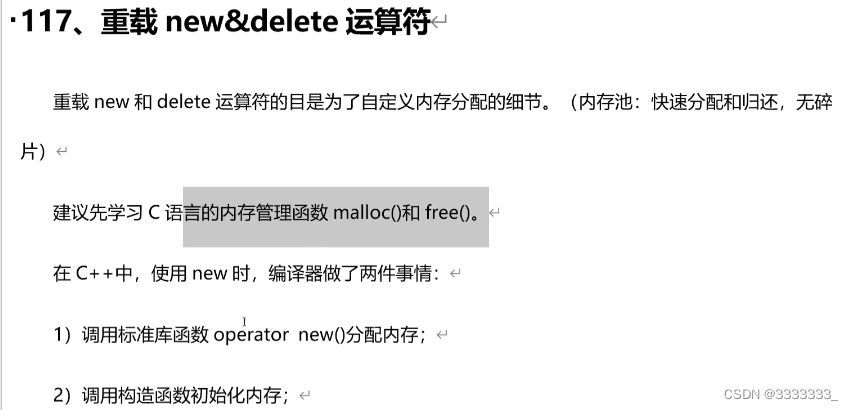
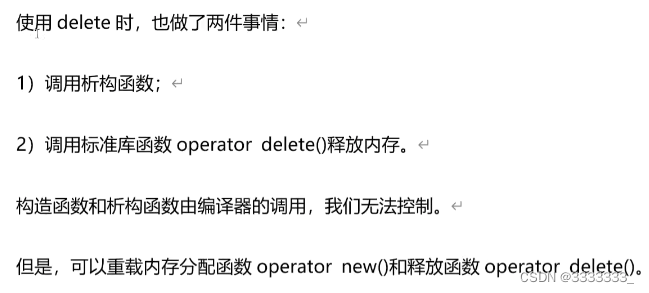
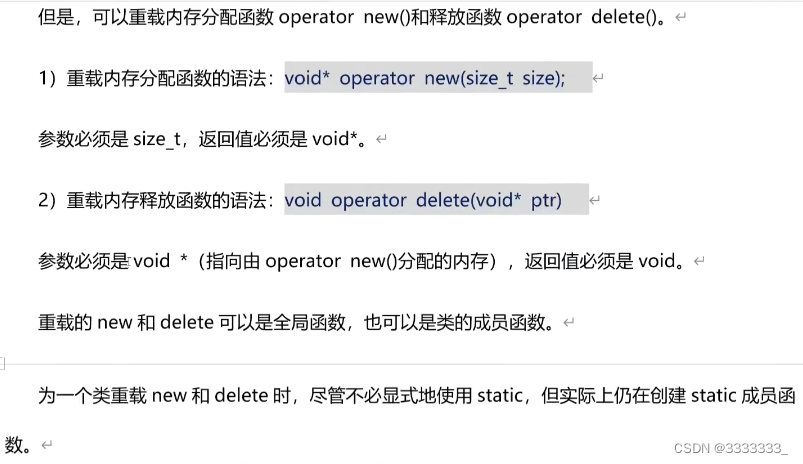

![]()
new[]和detele[]与 new和detele基本一致,在实际开发中,类用数组表示的 情况不多见,需要自定义分配内存的情况基本上没有,所以这两
为一个类重在new和delete时,尽管不必显示第使用static,但实际上仍在创建static成员函数 说明:
也就是说,声明这两个成员函数的时候,不管有没有写static关键字,它们都是静态成员函数,所以在这两个函数中,不能访问类的非静态成员。
#include <iostream>
using namespace std;
//为整型动态分配内存
void *operator new(size_t size) {
cout << "调用了重载的new:" << size << "字节" << endl;
void *p = malloc(size);
cout << "申请到的内存地址是:" << p << endl;
return p;
}
void operator delete(void *ptr) {
cout << "调用了重载的delete" << endl;
// if (ptr == 0) {//这是模拟C++的封装,所以C++中delete空指针也是安全的
if (ptr == nullptr) {//这是模拟C++的封装,所以C++中delete空指针也是安全的
return;
}
free(ptr);
}
void test() {
//对于我们来说,C++的new和delete缺省屏蔽了全部细节,如果我们重载了new和delete运算符,就可以
//用自己的代码申请和释放内存了。
int *p = new int(1);
cout << "p=" << p << ",*p=" << *p << endl;
cout << "p=" << (void *) p << ",*p=" << *p << endl;
delete p;
}
int main() {
test();
return 0;
}
/*
调用了重载的new:4字节
申请到的内存地址是:0x7fb2fc405910
p=0x7fb2fc405910,*p=1
p=0x7fb2fc405910,*p=1
调用了重载的delete
*/#include <iostream>
using namespace std;
//为类动态分配内存 全局
void *operator new(size_t size) {
cout << "调用了全局重载的new:" << size << "字节" << endl;
void *p = malloc(size);
cout << "申请到的内存地址是:" << p << endl;
return p;
}
void operator delete(void *ptr) {
cout << "调用了全局重载的delete" << endl;
// if (ptr == 0) {//这是模拟C++的封装,所以C++中delete空指针也是安全的
if (ptr == nullptr) {//这是模拟C++的封装,所以C++中delete空指针也是安全的
return;
}
free(ptr);
}
class Person {
public:
int m_age;
int m_score;
Person(int age, int score) {
m_age = age;
m_score = score;
cout << "调用了构造函数Person(int age, int score)" << endl;
}
~Person() {
cout << "调用了析构函数~Person()" << endl;
}
void *operator new(size_t size) {
cout << "调用了类重载的new:" << size << "字节" << endl;
void *p = malloc(size);
cout << "申请到的内存地址是:" << p << endl;
return p;
}
void operator delete(void *ptr) {
cout << "调用了类重载的delete" << endl;
// if (ptr == 0) {//这是模拟C++的封装,所以C++中delete空指针也是安全的
if (ptr == nullptr) {//这是模拟C++的封装,所以C++中delete空指针也是安全的
return;
}
free(ptr);
}
};
void test() {
//对于我们来说,C++的new和delete缺省屏蔽了全部细节,如果我们重载了new和delete运算符,就可以
//用自己的代码申请和释放内存了。
int *p = new int(1);
cout << "p=" << p << ",*p=" << *p << endl;
cout << "p=" << (void *) p << ",*p=" << *p << endl;
delete p;
cout << endl;
Person *p2 = new Person(1, 2);
cout << "p2的地址是" << p2 << " " << p2->m_age << " " << p2->m_score << endl;
delete p2;
}
int main() {
test();
return 0;
}
调用了全局重载的new:4字节
申请到的内存地址是:0x7ff198c05910
p=0x7ff198c05910,*p=1
p=0x7ff198c05910,*p=1
调用了全局重载的delete
调用了类重载的new:8字节
申请到的内存地址是:0x7ff198c05910
调用了构造函数Person(int age, int score)
p2的地址是0x7ff198c05910 1 2
调用了析构函数~Person()
调用了类重载的delete
